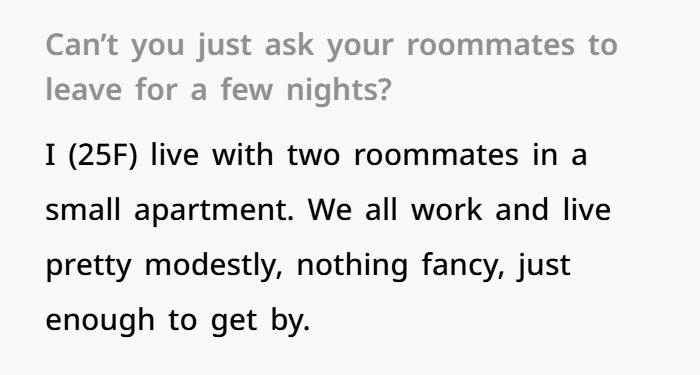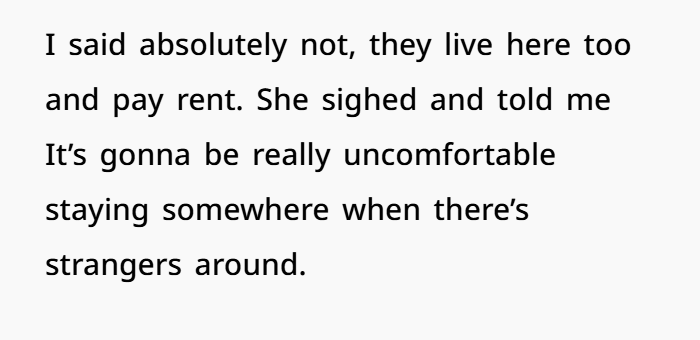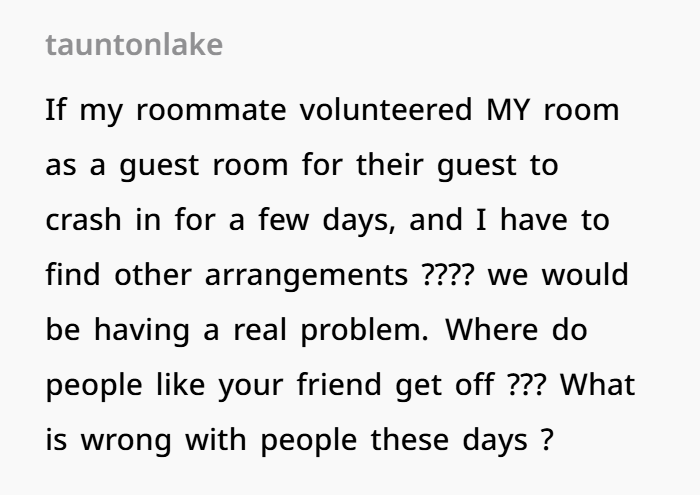Roommates’ Existence Becomes A Problem As Entitled Guest Demands They “Leave” For Her Comfort
Letting friends stay overnight is usually no problem—especially if you have extra space at home. In fact, around 30% of Americans say they welcome overnight guests a few times a year. But there’s a big difference between respectful visitors and those who cross the line.
One woman planned to stay at her friend’s house for a few days. But instead of being thankful for the couch, she demanded a private room—asking the friend’s roommates to give up their space so she could have more privacy and comfort.
This situation quickly turned into a lesson in guest etiquette and respecting roommate boundaries. It shows how important it is to manage expectations and not take advantage of someone’s hospitality. Whether you’re offering your place or staying with someone else, knowing the basics of hospitality tips and home-sharing manners can prevent awkward situations and keep friendships strong.
Read for more info Reddit
A woman agreed to let her friend crash at her place for a few nights
But the friend expected one of her roommates to give up their room for her






Houseguests should adapt to their host’s house rules and circumstances
True friendship means being there for each other—especially in tough times. Letting a friend stay over for the night may seem like a small favor. According to a YouGov poll, 41% of Americans enjoy having overnight guests, and 20% say they love hosting friends or family at home.
However, being a host isn’t always easy. There’s a flip side to opening your home. A Joybird survey found that 26% of people say friends are often the worst houseguests. The top complaints include:
- Leaving a mess
- Not helping with cleaning
- Being rude to the host, roommates, or family
In one real-life story, a woman hadn’t even arrived yet but was already demanding special treatment—asking for her own room and ignoring the fact that her friend had roommates. This kind of behavior shows poor guest etiquette and a lack of respect for the host’s personal space.
Certified etiquette expert Mariah Grumet Humbert says houseguests should always be flexible.
“You’re stepping into someone else’s home,” she explains. “Things may be different from what you’re used to, and that’s okay. You don’t have to give up your needs—but you do need to respect how the host and their household live.”
At the end of the day, the host is doing a favor. If someone wants more comfort, privacy, or control, choosing a hotel stay or a short-term rental is always a better option. It’s a great way to avoid conflict and ensure both the guest and the host feel comfortable.
A guest should make themselves almost invisible and cause as little inconvenience as possible
Hotels and Airbnbs can be expensive, especially if you’re trying to save money while traveling. That’s why many people choose to stay with friends instead. It’s a smart way to cut costs—but it does come with a few trade-offs. You may have to give up some comfort and privacy, just like the woman in this story, who expected hotel-level treatment from a friend’s shared apartment.
If you’re planning to crash at a friend’s place, it’s important to follow some basic couch surfing etiquette. Travel expert Erica Ho, founder of the Map Happy blog, shares simple but essential rules for being a great houseguest:
1. Be Invisible (Almost)
When you’re staying on someone’s couch, try to be low-maintenance. Avoid leaving a mess or drawing attention to yourself. Dirty dishes and clutter aren’t just annoying—they’re disrespectful to your host and their roommates.
2. Clean Up Daily
Sleeping in a shared space like a living room? Make it look neat every morning. Fold the sheets, tidy the area, and keep things organized so others can use the space during the day. This shows you value the host’s home.
3. No Extra Guests
Just because your friend is kind enough to host you for free doesn’t mean you can invite others over—especially not romantic partners. Always respect everyone in the house, not just your host.
4. Show Real Appreciation
Saying “thank you” is great—but taking action means more. You can cook dinner, order pizza for everyone, or bring a small gift. Thoughtful gestures go a long way when you’re staying somewhere for free.
5. Don’t Overstay
The common rule? Three nights max. If your stay gets longer, it might be time to contribute to bills or look for a short-term rental. As Erica Ho puts it, “If you’re asked to pay utilities, that’s your cue to move on.”
People in the comments called out the entitled friend: “With friends like these…”










